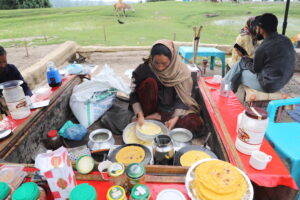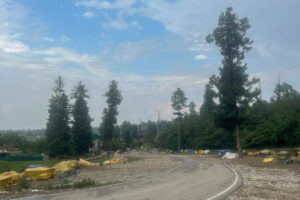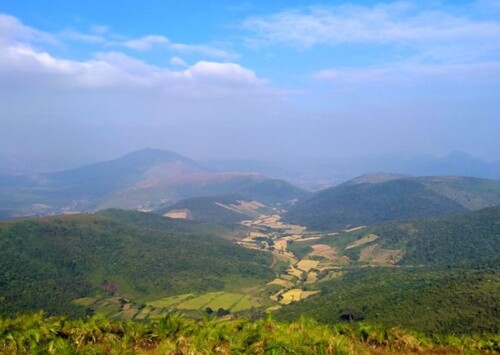Kashmiri tribal women unseen victims of Pahalgam terror attack
Closure of tourist spots in Kashmir robs women of livelihood

Before the attack in Pahalgam, the stalls thronged with tourists enjoying hot meals in the cool climes of Kashmir (Photo: Faisal Bashir)
The terror attack in Pahalgam in Jammu and Kashmir on April 22 that claimed 26 lives has left behind a large trail of destruction. Amongst its unseen victims are dozens of tribal women in Kashmir who used to run small tea-stalls in the region, but have now lost their livelihood as the government closed many parts of the valley to tourism, citing security as the reason.

Before the attack in Pahalgam, the stalls thronged with tourists enjoying hot meals in the cool climes of Kashmir (Photo: Faisal Bashir)
The beautiful meadows of Doodhpathri, a popular tourist destination in Budgam district of Jammu and Kashmir, were once filled with the laughter of tourists and the aroma of traditional snacks. Located about 45 km west of Srinagar, Doodhpathri attracted tourists who were drawn here by its scenic landscapes and tranquillity.
However, since a terror attack in Pahalgam, another popular tourist site in J&K, Doodhpathri is bereft of any sign of life, and a deadly silence now reigns here as the region’s government banned tourism from many parts, citing security concerns. According to the official sources, the government closed 48 out of 87 such tourists spots in view of the threat perception. These 48 destinations closed in the Kashmir Valley fall in eight districts and include Yousmarg, Tossamaidan, Doodhpathri, Aharbal, Kousarnag, and Bangus, among others.
The ban has not just shattered tourism, but also the dreams of financial independence of dozens of tribal women, who used to earn their livelihood by selling tea and snacks to the thousands of visitors. But as tourism has ground to a complete halt, their tea stalls stand abandoned.

Gujjar and Bakerwal women serving tea and snacks in Budgam’s Doodhpathri before the Pahalgam terror attack (Photo: Faisal Bashir)
A pleasant smell of roasted corn, chapatti made of maize flour, and strong tea once filled the fresh air of Doodhpathri’s beautiful meadows. Every day during the tourist season, the area was bustling with people walking along the roads, who stopped to enjoy local snacks and warm cups of noon chai, a traditional Kashmiri salty tea. Most of these stalls were built and decorated by Gujjar and Bakerwal women, who used to earn their sole incomes from these stalls, which were much more than mere food stops for them.
These women are not only small stall owners, but they are also a source of income, pride, and independence for their families, and for the entire tribal community. Many of them had stepped out of their homes for the first time to start these small shops. By serving tea and snacks to tourists, they were able to support their families, send their wards to school, and even take care of basic necessities in their homes.
The attack not only ended the season early, but it also took away the chance for these women to earn, grow, and be seen. The lively meadows turned quiet almost overnight. The women who were running these small stalls once moved around their business with hope, courage, laughter, and making conversation with their neighbours as well as tourists. But with the closure of stalls, they were forced to return home, unsure if they would ever open.
Looking at her locked stall, gently wiping dust from the wooden counter where the gas stove once steamed with noon chai, Razia Bano, a 37-year-old stall owner and a tribal woman, recounts the role that the stall played in her life, even as nearby, her nine-year-old son, Aarif, plays with a stone, still unsure why his mother no longer brings him to the bustling shop each morning.
“I saved money for months to buy that gas stove we were all ready for a good season, and then everything changed. Each cup of tea I sold helped me to run my home. Now that small financial freedom is gone,” Bano tells Media India Group
Bano says that before the attack, the local administration had spoken of women-led development being implemented in the region. Photographs were taken with the stall owners, and promises were made for better infrastructure and more visibility. Tourists crowded the area, often stopping to explore, asking about recipes, and learning about the lives of tribal women behind the food.

Once vibrant with laughter and hope, Doodhpathri’s deserted tea stalls now stand silent (Photo: Kaisar Ali)
For Bano and other women of Doodpathri, the loss was not just about money, but it was something much deeper and more personal. Many of them had fought hard for the right to step out of their homes and start small businesses. They had convinced their families, challenged traditional expectations, and even taken out small loans to build their food stalls.
“These stalls had given us a sense of purpose, pride, and independence. But after the sudden closure, the same families who once hesitantly supported us now point to our failure as proof that women should not work outside. What was once a quiet victory for women’s empowerment has turned into a painful reminder of how fragile that progress can be. Not a single official has since come to ask about us and what we would do next, and neither was any compensation given to us,” Yasmeena Jan, a 35-year-old stall owner, tells Media India Group.
As the late summer sun warms the meadows of Doodpathri, the wooden stalls remain closed, wrapped in polythene sheets sailing in the wind. Grass grows through cracks in the stone paths once trodden by tourists. “I don’t know if anyone will come back, but we have little option to wait for the betterment of our lives,” adds Yasmeena Jan, looking forlornly at the place where her stall stands.









